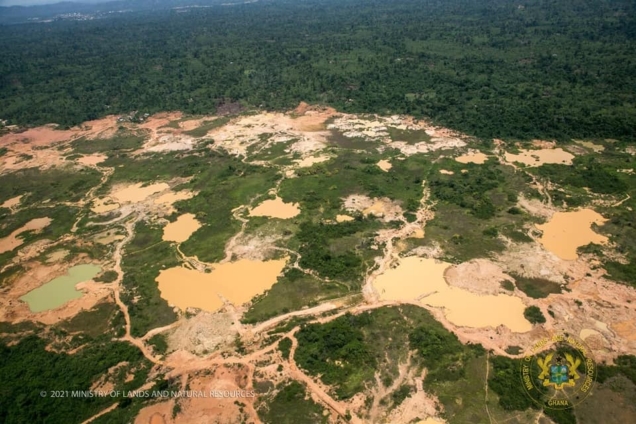The government has presented a new Legislative Instrument (LI) to Parliament aimed at revoking previous regulations that permitted mining activities in these sensitive areas.
The Environmental Protection (Mining in Forest Reserves) Revocation Instrument, 2024 seeks to overturn LI 2462, which had previously allowed mining in certain forest reserves, signalling government’s intensified commitment to conserving the nation’s environment.
The announcement was made by the Majority Leader and Leader of Government Business in Parliament, Alexander Kwamina Afenyo-Markin, during a parliamentary session on October 15.
He explained that the new LI was developed by the Ministry of Environment, Science, Technology, and Innovation, with technical backing from the Environmental Protection Agency (EPA) and in collaboration with the Ministry of Justice and the Attorney-General’s Department.
The new instrument is a key part of the government’s strategy to combat illegal mining, locally known as galamsey, which has plagued Ghana’s forest reserves, water bodies, and agricultural lands.
Over the past decade, illegal mining has caused widespread environmental degradation, including deforestation, water pollution, and the destruction of ecosystems critical to the livelihoods of local communities.
Mr Afenyo-Markin emphasized government’s determination to stop the destructive practice, saying, “This revocation is a clear demonstration of our commitment to addressing the illegal mining menace that has wreaked havoc on our environment.”
He further noted that this move would limit mining activities in the forest reserves, ensuring that only environmentally sustainable practices are permitted in line with Ghana’s long-term ecological goals.
While the new LI seeks to significantly restrict mining in forest reserves, its success will largely depend on its enforcement.
In recent years, despite various legislative attempts to curb galamsey, illegal mining has persisted, often due to weak enforcement, corruption, and the deep entrenchment of mining in local economies.
Recognizing this, Mr. Afenyo-Markin called on Ghanaians to unite in support of the fight against galamsey and refrain from politicizing the issue.
“The challenge of illegal mining transcends political lines, and we cannot afford to undermine these efforts by making it a political football,” he stated.
The revocation of LI 2462 is part of a broader government agenda to restore environmental integrity and promote sustainable development.
Ghana’s forests, which play a critical role in climate regulation, water cycle maintenance, and biodiversity conservation, have been under intense pressure from illegal mining activities, logging, and other forms of environmental exploitation.
Environmental groups and activists have long called for stricter measures to protect the nation’s natural resources, often pointing to the irreversible damage caused by mining in forested areas.
With the new LI in place, expectations are high that the government will not only halt mining in these areas but also take steps to rehabilitate damaged ecosystems.
The Majority Leader’s call for non-partisan support reflects the growing understanding that environmental conservation is a national responsibility. Involving local communities, civil society, and international partners in the fight against illegal mining will be crucial in ensuring the success of this new legislation.
The proposed revocation of the existing mining law is expected to undergo further parliamentary scrutiny before it is officially passed.
Meanwhile, stakeholders are keenly observing how the government will operationalize the instrument to yield meaningful environmental and socio-economic benefits.

